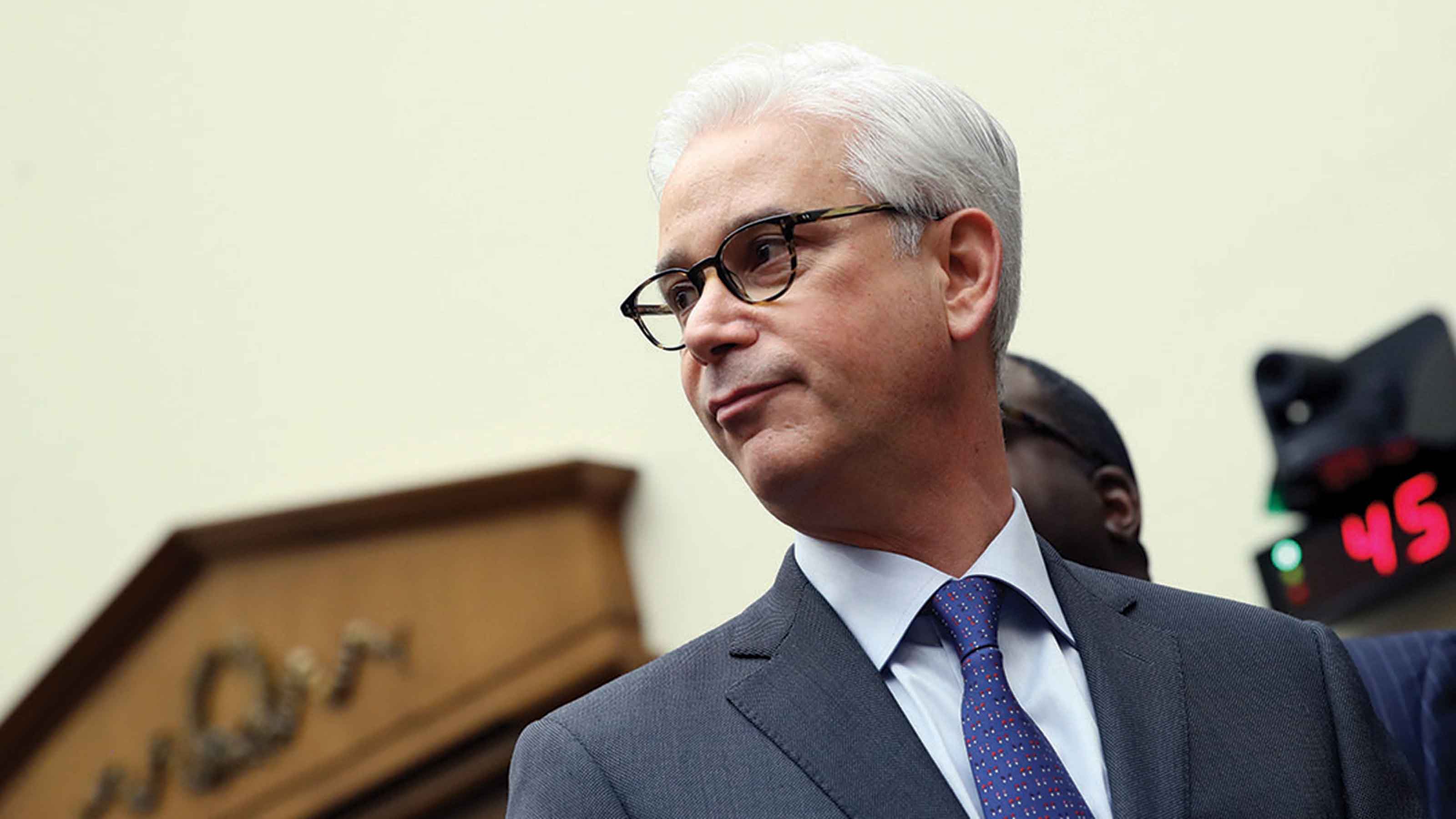How We Lose When We Overlook Black Talent
Comments from Wells Fargo CEO Charles Scharf (pictured) reflect a culture that tramples on clients’ trust and limits opportunities for people of color.


Profit and prosper with the best of Kiplinger's advice on investing, taxes, retirement, personal finance and much more. Delivered daily. Enter your email in the box and click Sign Me Up.
You are now subscribed
Your newsletter sign-up was successful
Want to add more newsletters?

Delivered daily
Kiplinger Today
Profit and prosper with the best of Kiplinger's advice on investing, taxes, retirement, personal finance and much more delivered daily. Smart money moves start here.

Sent five days a week
Kiplinger A Step Ahead
Get practical help to make better financial decisions in your everyday life, from spending to savings on top deals.

Delivered daily
Kiplinger Closing Bell
Get today's biggest financial and investing headlines delivered to your inbox every day the U.S. stock market is open.

Sent twice a week
Kiplinger Adviser Intel
Financial pros across the country share best practices and fresh tactics to preserve and grow your wealth.

Delivered weekly
Kiplinger Tax Tips
Trim your federal and state tax bills with practical tax-planning and tax-cutting strategies.

Sent twice a week
Kiplinger Retirement Tips
Your twice-a-week guide to planning and enjoying a financially secure and richly rewarding retirement

Sent bimonthly.
Kiplinger Adviser Angle
Insights for advisers, wealth managers and other financial professionals.

Sent twice a week
Kiplinger Investing Weekly
Your twice-a-week roundup of promising stocks, funds, companies and industries you should consider, ones you should avoid, and why.

Sent weekly for six weeks
Kiplinger Invest for Retirement
Your step-by-step six-part series on how to invest for retirement, from devising a successful strategy to exactly which investments to choose.
One of my early memories is when my dad taught me how to interpret the share price tables in the business section of the newspaper. My main task was to look up prices of Oppenheimer Funds and write them down in a ledger. I learned to appreciate the simplicity of how the numbers told a story about value. Yet of deeper importance was learning how to consider patience and timing to match the funds’ performance with a life plan.
So when I was drafted by the Chicago Cubs in 1991, I had a plan for my signing bonus. First and foremost was my parents’ recommendation that I retain a broker. Soon after, I would work with an adviser at Butcher & Singer, which through many mergers became Wells Fargo Advisors. My broker was, and still is, outstanding.
But there has been some troubling news about Wells Fargo, the main home for my financial life. This news revealed a track record of deceptive dealings with its customers, including settlements for both racially driven, exploitative lending and discriminatory hiring practices. Then came insensitive comments from Wells Fargo CEO Charles Scharf that he made on a call with employees this summer, which he reiterated in a memo: “While it might sound like an excuse, the unfortunate reality is that there is a very limited pool of black talent to recruit from.”
From just $107.88 $24.99 for Kiplinger Personal Finance
Become a smarter, better informed investor. Subscribe from just $107.88 $24.99, plus get up to 4 Special Issues

Sign up for Kiplinger’s Free Newsletters
Profit and prosper with the best of expert advice on investing, taxes, retirement, personal finance and more - straight to your e-mail.
Profit and prosper with the best of expert advice - straight to your e-mail.
Reaching for a future. This comment hit me hard, because wealth depends on trust in those who take care of my money. Money is not simply of quantifiable value; it has immeasurable qualitative value. It holds a future.
As a Black man, I seek more depth to leadership’s understanding of what reaching for a future truly means to a man of color. The “unfortunate reality” Scharf should have been speaking of is our nation’s legacy of systemic racism and how it has shaped opportunity.
It should matter if the returns we enjoy are reaped by discriminating against a people or if the culture that provided those returns views Black talent as charity, regardless of their qualifications.
Wells Fargo and other giants of the financial world are supposed to shun such destructive biases to allow the color of green to prevail over the color of skin. Yet they often do not. This explains the report by Citigroup that estimated that our economy lost $16 trillion over the past two decades due to discriminatory practices and sanctioned racial inequity.
We often forget that those who have power create what defines the word qualified—a word that is highly subjective, laced with nepotistic practices, and rife with compounding advantage for those of privilege. Like the success of Hamilton: An American Musical, there are countless examples of how candidates of color can be successful inside the talent blind spot of corporate hiring templates.
The real danger is having algorithms of predictive success and not understanding how much they drip with bias. This often occurs because leadership is not representative of all, and many of those in the room who represent the diversity have no real power.
We also must not assume that representation means welcoming inclusion. It is nice to get the job, but the culture around the job is more consequential to making sure that people advance fairly and are not harassed, ignored or treated as if they do not deserve that opportunity in the first place.
Scharf has apologized, saying he made an “insensitive comment reflecting my own unconscious bias.” He expressed a commitment to work for more diverse leadership. Yet I still feel compelled to consider other options for my family’s money, even with our nearly 30-year relationship. I hope Wells Fargo decides to define talent differently, not just in one image but in all of our images.
My father passed away on the day I got the 1,000th hit of my Major League career—a career that was critical to building wealth. I came to understand that inside those share prices in my portfolio are people, many of whom are people of color reflecting the dream that brought my father to the U.S. from Trinidad and my mother out of the Jim Crow South. Their legacies are important to preserve, too. And to do so, we must face some unfortunate truths about the role of racism, truths that have nothing to do with talent and everything to do with opportunity.
Doug Glanville is a baseball commentator and former player who teaches a course on sports and society at the University of Connecticut.
Profit and prosper with the best of Kiplinger's advice on investing, taxes, retirement, personal finance and much more. Delivered daily. Enter your email in the box and click Sign Me Up.

Doug Glanville is a baseball commentator and former player who teaches a course on sports and society at the University of Connecticut.
-
 The New Reality for Entertainment
The New Reality for EntertainmentThe Kiplinger Letter The entertainment industry is shifting as movie and TV companies face fierce competition, fight for attention and cope with artificial intelligence.
-
 Stocks Sink With Alphabet, Bitcoin: Stock Market Today
Stocks Sink With Alphabet, Bitcoin: Stock Market TodayA dismal round of jobs data did little to lift sentiment on Thursday.
-
 Betting on Super Bowl 2026? New IRS Tax Changes Could Cost You
Betting on Super Bowl 2026? New IRS Tax Changes Could Cost YouTaxable Income When Super Bowl LX hype fades, some fans may be surprised to learn that sports betting tax rules have shifted.
-
 9 Types of Insurance You Probably Don't Need
9 Types of Insurance You Probably Don't NeedFinancial Planning If you're paying for these types of insurance, you may be wasting your money. Here's what you need to know.
-
 Amazon Resale: Where Amazon Prime Returns Become Your Online Bargains
Amazon Resale: Where Amazon Prime Returns Become Your Online BargainsFeature Amazon Resale products may have some imperfections, but that often leads to wildly discounted prices.
-
 Roth IRA Contribution Limits for 2026
Roth IRA Contribution Limits for 2026Roth IRAs Roth IRAs allow you to save for retirement with after-tax dollars while you're working, and then withdraw those contributions and earnings tax-free when you retire. Here's a look at 2026 limits and income-based phaseouts.
-
 How to Search For Foreclosures Near You: Best Websites for Listings
How to Search For Foreclosures Near You: Best Websites for ListingsMaking Your Money Last Searching for a foreclosed home? These top-rated foreclosure websites — including free, paid and government options — can help you find listings near you.
-
 Four Tips for Renting Out Your Home on Airbnb
Four Tips for Renting Out Your Home on Airbnbreal estate Here's what you should know before listing your home on Airbnb.
-
 Five Ways to a Cheap Last-Minute Vacation
Five Ways to a Cheap Last-Minute VacationTravel It is possible to pull off a cheap last-minute vacation. Here are some tips to make it happen.
-
 How Much Life Insurance Do You Need?
How Much Life Insurance Do You Need?insurance When assessing how much life insurance you need, take a systematic approach instead of relying on rules of thumb.
-
 When Does Amazon Prime Day End in October? Everything We Know, Plus the Best Deals on Samsonite, Samsung and More
When Does Amazon Prime Day End in October? Everything We Know, Plus the Best Deals on Samsonite, Samsung and MoreAmazon Prime The Amazon Prime Big Deal Days sale ends soon. Here are the key details you need to know, plus some of our favorite deals members can shop before it's over.